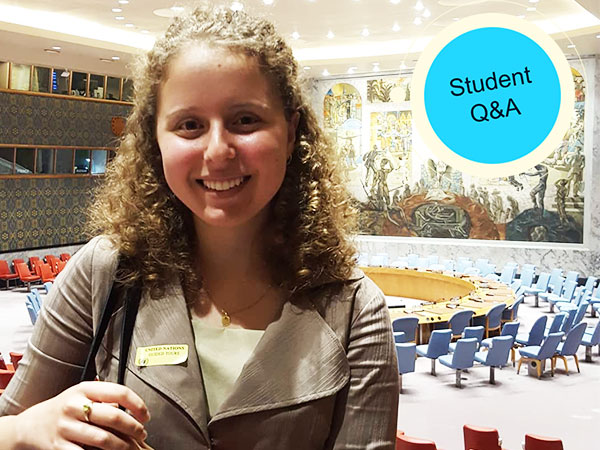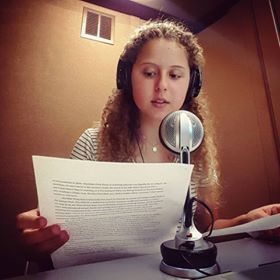
Senior Victoria Erdel Garcia grew up mostly in the U.S., but has had a multicultural upbringing. Her family is originally from Ecuador and she lived in Portugal for four years as a child. This international experience has given Garcia a passion for learning about various cultures and their biggest problems. Here, she tells us how that passion led to research on human trafficking and the 2018 Nobel Peace Prize Forum.
Major: Sociology
Minor: Teaching English to Speakers of Other Languages (TESOL)
Hometown: Mishawaka, IN
Clubs and campus involvement: Founder/host of The Trafficking Dispatch podcast, Kellogg International Scholar, Writing Center tutor, Writing and Rhetoric tutorial teaching assistant, Student Workers Participation Committee
Your sociology major came of your interest in other cultures, but you started as a pre-health major. How did you decide to make the switch?
Even though my upbringing stoked my interest in social problems, majoring in sociology was not an immediate decision. I came to Notre Dame on the pre-health track, believing that I would one day go to medical school and become a doctor. I wanted to do this simply because I wanted to help others and being a doctor seemed like the most obvious (read: only) option. I realized pretty early on in my first year that I was not pursuing this end effectively, so I began to think more critically about how I could help others with my own interests and abilities.
I realized that human rights research—specifically on the topic of human trafficking—social work, and teaching are my true interests, so majoring in sociology became an obvious choice. As for TESOL, I have always been interested in this field due to my personal experiences as an [English as a Second Language] student in elementary school.
Your senior thesis is on The Production and Publication Processes of Social Media Content at an Anti-Trafficking Social Enterprise. What led to your interest in that topic?
I’m researching the social media marketing practices of an anti-sex trafficking social enterprise. There is already some research on what the general public sees about human trafficking on social media, and how this social media content affects their understanding of the issue. However, there isn’t any research done on how/why anti-trafficking organizations create this content in the first place, and what restraints there are in relaying information about human trafficking through social media.
My interest in the topic emerged from my internship at an anti-sex trafficking organization* in Asia the summer after my sophomore year. As their marketing and communications intern, I had to create content (photos/videos) for their social media, but I noticed that only a few things that I submitted were actually posted. I began to wonder why this was the case and what the organization wanted (or didn’t want) their followers to know about their organization and the anti-trafficking field in general.
You presented at the 2018 Nobel Peace Prize Forum. How did that opportunity come about?
 Garcia hosts a podcast, The Trafficking Dispatch.
Garcia hosts a podcast, The Trafficking Dispatch.
In the spring 2018 semester, I was one of four winners of the Global Citizenship Essay Contest who got to participate in the corresponding Global Forum with Dr. Muhammad Yunus, the 2006 recipient of the Nobel Peace Prize. During the forum, he talked about the Sustainable Development Goals (SDGs) quite a lot, but I didn’t really know what they were. His visit prompted me to research the SDGs. I learned that they already aligned with my anti-trafficking work so I began to look for opportunities to learn and apply the SDGs.
One of these opportunities was pitching my anti-trafficking podcast, The Trafficking Dispatch, to the youth branch of the UN Sustainable Development Solutions Network (SDSN) for inclusion in their 2018 Youth Solutions Report. The podcast was included in the report under the SDG of Peace and Justice.
Around the same time, I represented the U.S. as a delegate for Peace and Justice (and two other SDGs) at the UN Youth Assembly. The day after returning from the Assembly, the UN SDSN Youth reached out to me and asked if I would like to present alongside them at the Nobel Peace Prize Forum in Minnesota on the SDG of Peace and Justice.
I went to the conference and presented on The Trafficking Dispatch, how it connects to the SDG of Peace and Justice, and how youth can lead their own advocacy initiatives and get support from the UN. It was an incredible and uplifting experience that introduced me to many young advocates for other social problems, as well as advocates who had been working on their particular issue for decades.
Do you have any advice for future Notre Dame students?
My number one piece of advice would be that, no matter what you end up majoring/minoring in, remember that your learning does not stop within those academic disciplines. Always be willing to learn something new! This can be through clubs at ND, study abroad, or just in your free time (yes, it exists if you budget your time well). For example, in my last year of college, I have started learning how to sew, code, and watercolor, just for the fun of it.
That being said, if you find something that you are particularly interested in learning about, don’t be afraid to talk about it with others! I can’t even count the number of times that people have sent things my way because they thought it would interest me, and it has opened so many doors. Even when I thought others were only casually listening to my interests, opportunities to serve the ND community just fell in my lap because they had nominated me for the role!
*Details are omitted to protect the security of the organization.